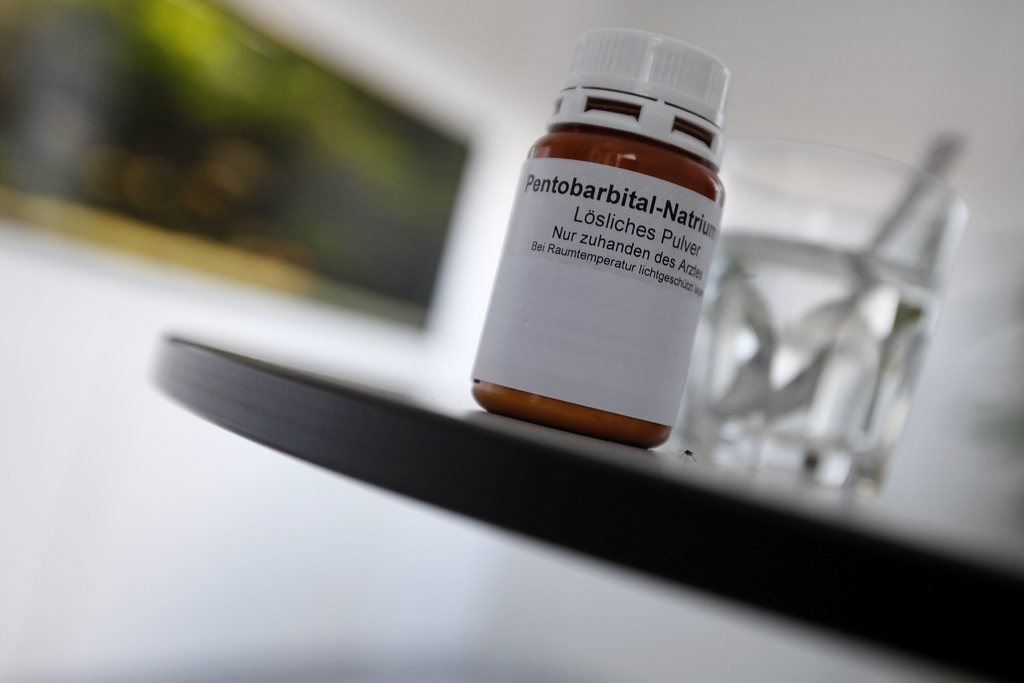British laws aim to end Swiss ‘death tourism’

Britain is grappling with two laws on assisted suicide, with England and Wales on one side and Scotland on the other. The political and social debate often turns to Switzerland, where 244 Britons went to die between 1998 and 2013.
“We have a clear problem,” James Harris, head of campaigns and communications at pro-euthanasia lobby Dignity in Dying, told swissinfo.ch.
“Dying people are ending their lives alone and without support or are reliant on the illegal assistance of a loved one or a doctor. They are terminally ill people who want to control their deaths when that death is imminent and they consider their suffering unbearable.”
The current legal reference point is the 1961 Suicide Act, which punishes anyone helping someone else end their life with up to 14 years in prison.
In a sign of how this emotive bioethical issue has gained in political importance, London and Edinburgh – which have different legal systems – are both preparing to debate separate bills on assisted suicide.
In November 2010, the Commission on Assisted Dying, also known as the Falconer Commission after a Labour politician, was set up, comprising lawyers, psychologists, doctors and philosophers.
“They examined the problem and reached the conclusion that a law was needed that regulates this issue,” Harris said.
The Falconer Bill will probably be discussed in parliament in June or July this year, before the summer break, he added. “But if it passes, assisted suicide will be legal only in England and Wales.”
In Scotland, a bill put forward in November by independent politician Margo MacDonald aims to legalise assisted suicide for terminally ill people and those with life-limiting conditions. MacDonald, who suffered from Parkinson’s Disease, died on April 4 aged 70. The bill will now be carried forward by Patrick Harvie, leader of the Scottish Green Party.
Swiss law tolerates assisted suicide when patients commit the act themselves and helpers have no vested interest in their death. Assisted suicide has been allowed in the country since 1942.
Active euthanasia, on the other hand – taking specific steps to cause a patient’s death, such as injecting them with drugs – remains illegal.
With assisted suicide, death is usually induced through a lethal dose of barbiturates that has been prescribed by a doctor. Ingestion of the poison, whether by drinking it or through the use of intravenous drips or stomach tubes, must be carried out by the person wanting to die.
A 2006 decision by the Swiss Federal Court ruled that all people of sound judgment, irrespective of whether they suffer from a mental illness, have the right to decide the manner of their death.
The government examined various options to regulate assisted suicide practices and in June 2011 decided not to seek changes in the law, but to boost suicide prevention and palliative care.
Death tourists
The aim of these bills is to end so-called “death tourism” to Switzerland, which is increasingly popular among Britons. Between 1998 and 2013, 244 of them travelled to Switzerland to die (29 last year), putting them second only to Germans.
Supporters and opponents of assisted suicide say this should stop – although for different reasons.
Supporters believe that if someone wants to end their life, they should be able to do so in their own country; the pro-life movement opposes any law, however restrictive, that legalises the taking of a life.
What’s more, whoever accompanies an ill person to Switzerland, knowing that he or she intends to die, can be accused on their return by the British authorities of “inciting suicide”, which is illegal and punishable.

More
Assisted suicide: dignified death, or euthanasia?
Right to die well
Harris says that when people contact Dignity in Dying, the organisation cannot provide any information about the Swiss procedure of assisted suicide, because to do so would be illegal.
“We have ruled out direct medical assistance to die – euthanasia – as practised in Belgium and the Netherlands. The Swiss model of indirect assistance contains an important safeguard that patients must administer the life-ending medication themselves – so as to further ensure that it is their decision to control their death,” he said.
“Where we differ from Switzerland and agree with the US States of Oregon and Washington, is that such assistance must be strictly limited to terminally ill, mentally competent adults. It’s less the right to die, rather the right when dying to die well.”
Indeed, the Falconer Bill is restricted to people with a life expectancy of less than six months.
In Scotland, on the other hand, the limits of the proposed law are less restrictive, applying to people over 16, as opposed to 18 south of the border.
Switzerland has two main organisations which help seeking an assisted suicide, Exit and Dignitas.
In 2013, Exit – which only helps those who are permanently resident in the country – helped 459 people end their lives.
In 2013, Dignitas helped 205 people die. Of these, only 8 were Swiss: 92 were German, 29 British, 22 French, 14 Italian, 10 from the United States, 8 Canadian and 7 Austrian. The remaining cases came from 10 or so countries (see link).
‘No surrender’
But even if the English or Scottish bills pass with restrictions, this won’t be enough for members of the pro-life movement, who reject any form of legalisation whatsoever. The fact that the British public support the law doesn’t discourage them.
“Even if the media say that all polls show British people support a law, we will not surrender,” Peter Saunders, president of Care Not Killing and chief executive of the Christian Medical Fellowship, told swissinfo.ch.
“We don’t want any kind of change in the current law system because a new law would be dangerous for the weakest people and those in need, such as the disabled or depressed.”
The pro-life movement acknowledges that the Falconer Bill only applies to terminal cases, but cites the slippery slope argument.
“In practice, every law is for only a specific category of people, but this category always becomes wider and wider. Think about what’s happening in Belgium, where euthanasia is now allowed for children,” Saunders, a medical doctor, said.
“Our organisation demands that this trend is stopped and that there is better medical and psychological assistance and better palliative care. We never want to see a law that protects people who help others kill themselves.”
(Adapted from Italian by Thomas Stephens)

In compliance with the JTI standards
More: SWI swissinfo.ch certified by the Journalism Trust Initiative











You can find an overview of ongoing debates with our journalists here . Please join us!
If you want to start a conversation about a topic raised in this article or want to report factual errors, email us at english@swissinfo.ch.